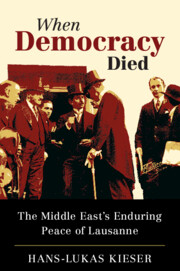
- Cited by 4
-
Cited byCrossref Citations
This Book has been cited by the following publications. This list is generated based on data provided by Crossref.
Ophir, Assa 2024. The Lausanne conference of 1922–23 and the battle over the conscription of the non-Muslim minorities in Turkey. Immigrants & Minorities, Vol. 42, Issue. 2, p. 190.
Nefes, Türkay Salim Kaymak, Özgür and Gürpınar, Doğan 2024. Examining factors influencing Turkish Jewish attitudes towards the Armenian genocide. The British Journal of Sociology, Vol. 75, Issue. 4, p. 574.
Macleod, Jenny 2025. Chanak and the Memory of Gallipoli: A British Crisis of Cultural Demobilisation. The Journal of Imperial and Commonwealth History, Vol. 53, Issue. 1, p. 107.
Shahollari, Lediona 2025. The Meanings of Home: The Case of the Vinan Refugee Families and the 1923 Greek-Turkish Population Exchange. Nationalities Papers, Vol. 53, Issue. 3, p. 702.
- Publisher:
- Cambridge University Press
- Online publication date:
- April 2023
- Print publication year:
- 2023
- Online ISBN:
- 9781009029957


